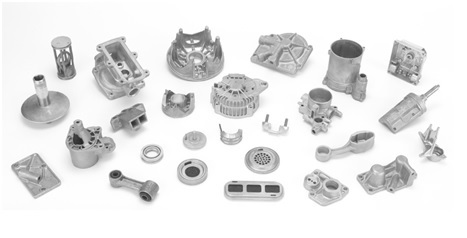Introduction
Aluminum casting molds have been a cornerstone of the manufacturing industry for decades, shaping everything from intricate automotive parts to aerospace components. In this article, we dive into the world of aluminum casting molds, exploring their remarkable benefits, the challenges they pose, and presenting illuminating case studies that underscore their crucial role in various industries.
Benefits of Aluminum Casting Molds
Precision and Detail: One of the primary advantages of aluminum casting molds is their ability to replicate intricate details and complex geometries. This precision is particularly valuable in industries such as automotive, where the smallest variation can impact performance. Aluminum molds can produce high-precision components with consistency, reducing the margin for error.
Lightweight and Strong: Aluminum is renowned for its remarkable strength-to-weight ratio. As a material for casting molds, it offers the advantage of lightweight mold components without compromising on durability. This translates to more manageable mold handling and reduced wear and tear.
Fast Cooling and Solidification: Aluminum molds have impressive heat-conducting properties, allowing for faster cooling and solidification of cast parts. This accelerated production process reduces cycle times and enhances productivity, making aluminum casting molds an attractive choice for high-volume manufacturing.
Heat Resistance and Durability: Aluminum casting molds possess exceptional heat resistance, ensuring that they maintain their structural integrity even when exposed to high temperatures during casting. This longevity means that they can withstand the stresses of repeated use, minimizing the need for frequent mold replacements.
Challenges in Aluminum Casting Mold Manufacturing
Initial Investment: Setting up aluminum casting mold manufacturing requires a substantial initial investment in mold design, specialized machinery, and skilled labor. Smaller manufacturers may face challenges in accessing these resources.
Material Selection: Selecting the appropriate aluminum alloy is crucial for achieving desired properties in the mold. Different alloys offer varying levels of strength, thermal conductivity, and corrosion resistance, and making the right choice can be a complex decision.
Mold Maintenance: While aluminum molds are durable, they require regular maintenance to ensure they remain in optimal condition. Over time, mold surfaces may wear, leading to reduced precision and quality of cast parts. Regular maintenance is necessary to extend mold lifespan.
Resource Efficiency: Recycling and reusing aluminum can pose challenges due to energy-intensive processes required for material recovery. Manufacturers must adopt efficient recycling and sustainable practices to mitigate these challenges and reduce environmental impact.
Case Studies: Aluminum Casting Mold Applications
Automotive Industry: A leading automobile manufacturer leveraged aluminum casting molds to produce engine components with high precision and dimensional accuracy. These molds allowed the manufacturer to reduce the weight of engine parts while maintaining exceptional strength and durability. As a result, the company enhanced fuel efficiency and overall vehicle performance.
Aerospace Manufacturing: An aerospace manufacturer implemented aluminum casting molds to produce complex aircraft components. The lightweight and strong properties of aluminum molds ensured the production of lightweight yet sturdy parts that met strict aerospace quality standards. The result was enhanced aircraft performance and fuel efficiency.
Medical Device Production: A medical device manufacturer used aluminum casting molds to create intricate and high-precision components for surgical instruments. The speed of solidification offered by aluminum molds enabled efficient mass production while maintaining the fine details necessary for precise surgical procedures. This led to a reduction in manufacturing costs and improved patient care.
Consumer Electronics: A consumer electronics company turned to aluminum casting molds to produce casings for its products. The lightweight yet durable nature of these molds allowed for the rapid production of sleek and stylish electronic devices. The aluminum molds helped the company meet the growing demand for consumer electronics while ensuring quality and consistency.
Conclusion
Aluminum casting molds have carved a significant niche in the manufacturing industry, offering precision, durability, and rapid production capabilities. The benefits of aluminum casting molds encompass precision, strength, and heat resistance, while challenges include initial investments, material selection, and mold maintenance. Real-world case studies in the automotive, aerospace, medical device, and consumer electronics industries underscore the vital role of aluminum casting molds in diverse manufacturing applications. As industries continue to demand lightweight and high-precision components, the role of aluminum casting molds remains central to shaping the future of manufacturing and innovation.
-

- Bicycle Freehub 12/14/16 ιντσών Παιδικό ποδήλατο Ποδήλατα Low Rider Ποδήλατα μαγνησίου από κράμα αλουμινίου Παιδικό ποδήλατο 3-8 ετών Διαθέσιμο
-

- ανταλλακτικά και εξαρτήματα για πιρούνι ανάρτησης ποδηλάτου για MTB
-

- Μεταλλικά εξαρτήματα σέρβις χύτευσης OEM της μέσης macbook
-

- Ποδήλατα για παιδιά Παιδικά Ποδήλατα για Παιδιά 3-16 ετών /OEM Baby Children Cycle Kids Mountain Bicycles 2022
-

- Thixomolding magnesium parts & components mobile phone middle board
-

- Integrated 3-spoke wheel for MTB with CNC machining &surface treatment

 0086-750-5616188
0086-750-5616188 +86 13392089688
+86 13392089688 sales@zhongmei-tech.com
sales@zhongmei-tech.com








